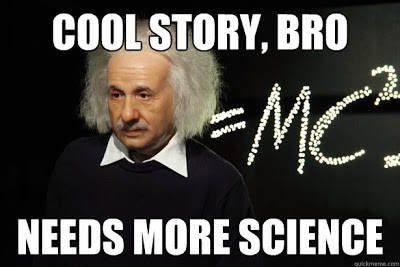“Running makes you fat.”
“Super high fat diets optimize endurance.”
“Barefoot running is the Kenyans’ key to success.”
“High intensity intervals have made long slow distance obsolete.”
Huh? Lately I’ve been hearing a lot of strong convictions on what are often complex, technical topics. More often than not, these are backed up by hand-waving and perhaps a vague reference to a “scientific study”, if anything.
It’s awesome when people take an interest in science. Public access to scientific journal articles has never been better, aided by tools like Google Scholar, PubMed and the #ICanHazPdf Twitter hashtag.
Scholars are taught to trace information back to its primary source. An article, webpage, interview, forum thread or conversation may pique your curiosity on a topic, but it shouldn’t form the basis of a vocal opinion. People who spout convictions on technical topics owe it to themselves and others to back them up with a balanced understanding grounded in peer-reviewed science.
My job in environmental consulting, as well as my interest in sports science, involve sifting though reams of journal articles on a broad range of topics. I make no pretense of being an expert in any single field, but I can usually still get the gist of things with a quick-and-dirty literature review. And so can you!
Here’s my layman’s approach to interpreting the research I dig up on a topic:
- Results of one study: Cool story bro, needs more science.
- A few studies with the same conclusion: Hmm, interesting. Seems like we’re onto something…
- Many studies, a major review or meta-analysis pointing in the same direction: Compelling evidence (but still not necessarily a consensus). This looks solid, but are there contrasting views?
- Overwhelming body of peer-reviewed evidence, near unanimity in the scientific community: Consensus (but still not necessarily fact). This is about as certain as it gets, for now. After all, even our understanding of gravity is just a theory.
A single study proves nothing. Taken alone, it is little more than a curiosity. Even a handful of studies that run contrary to a well-established body of scientific research do not constitute a debate, or even the absence of a consensus. Many so-called “hot button issues” aren’t contentious at all among experts.
Not all sources are created equal. Have a critical eye for methodology, publication reputation/quality, sample size, funding sources, potential conflicts of interest, political agendas and other biases. It doesn’t take a PhD to spot a flaw!
It’s also a mistake to assume that you can grasp the details of a study by skimming the abstract.
Most of all, beware broscience, that is, anecdotal accounts, misconceptions or shoddy science bandied about until they become entrenched as “fact”.
Enthusiasm for new ideas is important, since some of today’s fringe ideas will undoubtedly become tomorrow’s mainstream science (and vice versa). That said, it never hurts to default to silent skepticism until you are informed enough to draw a conclusion and share it with others. Earn your opinions!







